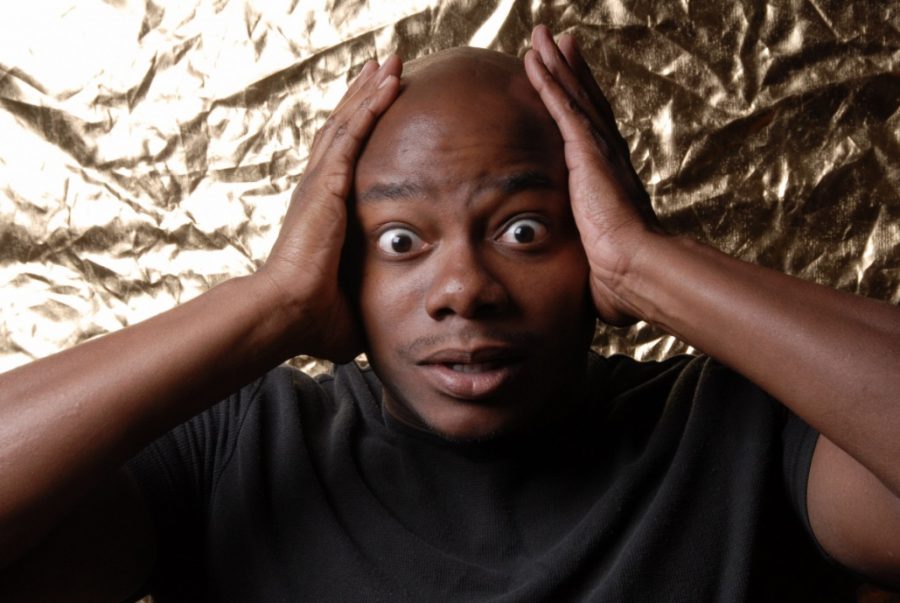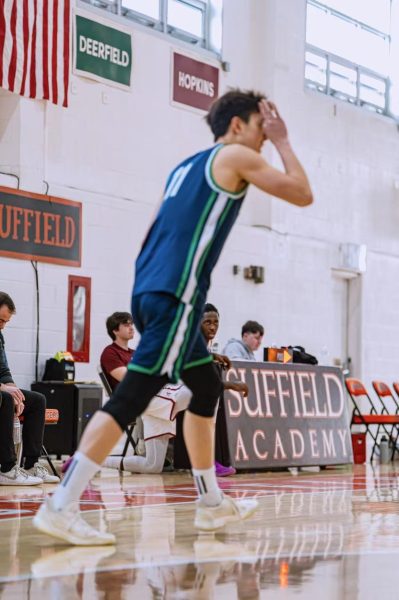MLK Speaker Challenges, Captivates Audience
“My pain is my gift,” said Dr. Mykee Fowlin as he spoke to a captivated audience on Martin Luther King Jr. day during the all-school assembly. He talked about controversial, divisive topics and spoke candidly about his own struggles, all while keeping it light-hearted and entertaining.
Dr. Fowlin is a performance artist, psychologist, poet, and motivational speaker. He received a doctorate degree in clinical psychology from Rutgers University. According to his website, his mission is to “create an atmosphere of worldwide inclusion, not just tolerance, towards all people.”
He spoke to campus about racism, gender equity, depression, anxiety, social pressure, and the pressure to be perfect. Dr. Fowlin was able to reach everyone in the audience with his touching speech. He conveyed his message through acting out multiple different personas.
Dr. Fowlin mentioned that everyone wears a mask, whether it is to hide our pain or insecurities. He then introduced his concept of the Japanese teacup philosophy, which is when he went to a sushi restaurant and he got his tea in a cup with no handles. He explained that he is not afraid to seem ignorant by asking about different cultures. “I’m still ignorant, it doesn’t matter. I want you to feel comfortable in your ignorance. The Only way to shift and adjust is to face it,” he said.
The waiter reacted in a kindly manner without giving him any judgement. “He did not yell at me, he didn’t smack me in the head, he didn’t label me. He simply educated me.”
The waiter explained that “If it is too hot to hold, it is too hot to drink.”
Dr. Fowlin discussed the realistic expectations of society, which is that people judge others by their handles. However, he said that race, religion, sexuality, political views, colleges, and grades do not define us.
He told the audience, “You don’t know me until you know me” and continued with his skit.
His skit consisted of a prop on each of the four chairs onstage. The props were a red Elmo cap, a Rutgers jacket, a sweatshirt that read HATE ME, and a scarf. He explained that the skit was composed of pieces of him and of other people.
He begins with reciting a poem called “Still Here” by Langston Hughes. Throughout his skit, he took up different personas including a little kid, a D1 football athlete, an adopted Mexican Jew, and a Palestinian and Korean student female student.
He changed the pitches of his voice for different people, and used body language to reflect upon the characters. After doing a performance with each personality, he would move onto the next one.
Each character struggled with something, whether sexuality, hate, racism, and gender. Even though he tackled serious topics, Dr. Fowlin always managed to crack a few jokes.
After the skit, he moved on to talk about pain. He emphasized the importance to speak out if we are hurting or struggling. “Pain, keeping it stuck inside, actually kills you,” he said. People with depression and anxiety, he said, believe that they are alone.
He urged people, especially men, to stand up for others when it comes to gender equity. He said, “If I remain silent, I’m part of the problem. As soon as I laugh, I become part of the assault.”
“I know that guys will listen to me first before they ever listen to a woman,” he said. “Being an ally is an important role, be able to speak up if it is not right. Don’t be afraid to be an ally, you have a role.”
Dr. Fowlin shared with the audience the darkest times of his life, including having an abusive father, childhood molestation by a friend, receiving a diagnosis of clinical depression at eight years old, and suffering form an eating disorder in high school.
“I had a 3.83 GPA, was Magna Cum Laude, and speaker at Baccalaureate, and I thought ‘What is the quickest way to end my life at 23 years old?”’ Thankfully, his youth pastor was able to stop him from committing suicide.
He ended his speech with an impactful message. “I’m fortunate because I get to see the effect on this world because I decided to stay in this world. If I ended my life too soon then I would have missed out on all of this,” he said.
Sonia Whitman, a junior from Greenwich, Connecticut, thought he was very interesting and covered a lot of topics we don’t normally talk about at Williston. ” It’s good to open people’s eyes to things behind closed doors,” she said.
Her favorite part was when he acted out the four different personalities. She explained, “He wasn’t just making it about race and gender, he was making it something that everyone can relate to.”
Amya James, a freshmen from Brooklyn, NY., agreed with Sonia about how lots of people can relate to his speech. “He was really relatable, and he didn’t just go up there and give a really long speech,” she said.
“It’s easy to talk about race, but people are just like ‘here we go again.’ Gender equality needs more attention and he didn’t just go up there and talk about MLK, and what people already know,” she told The Willistonian.
Junior Anaya Akpalu, loved the speaker as well. She believed that everyone in the audience could relate to him in some way. “[He] had the amazing ability to touch every single person in the chapel one way or another,” she said. “He was so intelligent and used humor and elements of surprise to make sure his audience was constantly engaged.”
The part that struck her the most was the Japanese teacup philosophy. Anaya told The Willistonian, “I feel like sometimes we get so comfortable with the norms of society, and we refuse to believe there are better ways of doing things.”
“The only way we progress and learn is by asking question and challenging what we think we know,” she continued.
She emphasized that Dr. Fowlin was a “perfect fit” for MLK Day because he emphasized the importance of unity in difference. “MLK stressed the importance of seeing passed racial differences and Dr. Fowlin spoke about seeing past race, mental health, age, gender, sexuality, and many other things.”
Anaya was touched by his speech and the energy in the room. “It was beautiful and necessary for the Williston community.”
Anne-Valerie Clitus, a junior from Irvington, New Jersey, said that reached people through his “humor and transparency,” which made his message more impactful.
She could relate to him on a personal level because of their similar stories. “His parents emigrated from Jamaica to raise their children in the U.S., as mine did from Haiti,” she said. “Our families come from similar backgrounds and despite his childhood trauma he made something of himself and today finds fulfillment in his work.”
Anne-Valerie continued, “Seeing him on the stage telling ‘our’ story really inspired me to keep pushing because he is proof that everything will fall into place for me in its own time.”
She told The Willistonian that Dr. Fowlin fits into honoring MLK because he preaches in the same way: using one’s pain as a gift. “While it took King time and a lot of mental anguish he eventually found his inner peace and threw everything he had into his work until his assassination.”
“King’s pain was his gift, and he used it,” she said.
Anne-Valerie felt drained after the assembly and she remembered looking around as the audience gave him a standing ovation. She noticed many students and faculty were either in tears or in silent reflection of his speech.
She praised Dr. Fowlin, describing him as “[One of the] very few past speakers who have achieved and made everyone in the chapel that day feel vulnerable and share in that vulnerability with each other.”
Liz Kay, a science teacher at Williston, thought that Dr. Fowlin was great at capturing the audience’s attention. “I don’t think you can get a speaker to come in for an hour and you can’t hear a pin drop,” she said. “It’s very hard to hold people’s attention for that long. He held your attention incredibly well by switching into characters.”
Kay continued, “He struck a nerve in some way in every single vulnerability you can possibly have.” Akivha Mazile, a senior and Kay’s advisee, nodded his head in agreement.
After the assembly, Kay felt that a debrief time was absolutely needed. “There was probably a line of 20 people wanting to talk to him [after the assembly.]”
“People were very respectful about giving that space. Boys, girls, and faculty were crying. They felt so connected with him that they needed that one on one time. Every single person that went up gave him a hug,” she told The Willistonian.
Erin is a senior from Taipei, Taiwan. She enjoys playing volleyball and watching "The Bachelor" during her free time.











